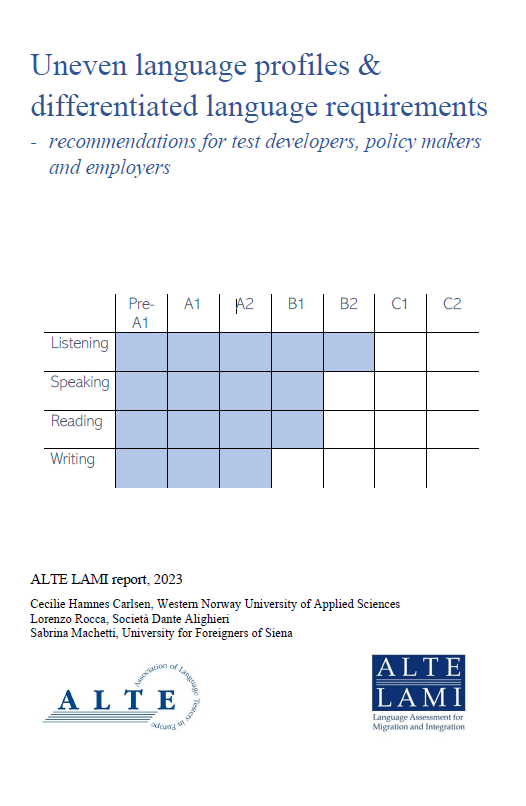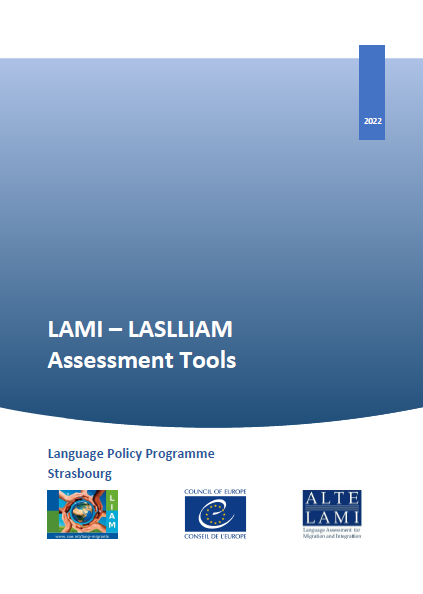SIG sulla Valutazione Linguistica per la Migrazione e l'Integrazione (LAMI) |
The LAMI group was formed in Salamanca in 2002 with the hope of representing a platform for language testers in supporting their attempts to ensure issues of test fairness and social justice within the migration context, according to ALTE's mission of sustaining diversity and maximising impact. LAMI means Language Assessment for Migrants’ Integration: it is a Special Interest Group that has been central to the discussion ALTE has been engaged in to consider the growing prominence of language testing in migration policy. |
Presidenti:Lorenzo Rocca (Chair) and Cecilie Hamnes Carlsen (Co-Chair). Aperto a:Anyone with an interest in teaching and assessment within the migration context. | Next Meetings:Thursday 6th November 2025, Pécs, Hungary For more information, please visit the ALTE events webpage | I Membri del LAMI stanno attualmente lavorando su:The following topics related to the migration context: literacy and language profiling of low literate learners, KoS tests and courses, GP in formal language tests, language requirements in the labour context, the use of first languages within the learning environments. For more details, here you can find the 2024 annual report. |
Our Publications: |
Uneven Language Profiles & Differentiated Language Requirements Report The aim of this report Uneven Language Profiles and Differentiated Language Requirements: Recommendations for test developers, policy makers and employers (2023) is to raise awareness about the advantages of an uneven profile approach in language testing, i.e., measuring learners’ language skills separately in different parts of the test. The report presents the results of a survey investigating whether ALTE members do indeed measure and report language skills separately in the tests they develop, as well as the degree to which test users in different Council of Europe member states set differentiated language requirements for different contexts. Finally, the report presents examples of good practice from five countries in which there are language tests measuring uneven language profiles as well as examples of test users setting differentiated language requirements. The target readers for this report are professionals working in language teaching and assessment, primarily in the migration context. | LAMI-LASLLIAM Assessment ToolsThe LAMI-LASLLIAM Assessment Tools (2022) is a collection of four assessment tools for using the Literacy and Second Language Learning for the Linguistic Integration of Adult Migrants (LASLLIAM) Reference Guide (a separate document published by the Council of Europe in 2022) for assessment purposes within learning environments. The tools are part of the broader work relating to piloting of the LASLLIAM scales used for teachers and volunteers involved in literacy and second language courses in the migration context. The tools are produced by ALTE's LAMI SIG in collaboration with the Council of Europe.
The LAMI-LASLLIAM Assessment Tools are available in 12 languages: Czech Dutch English Esperanto German Greek Italian Norwegian Romanian Slovenian Spanish |
Language and Knowledge of Society Policies for MigrantsReport on the 2018 Council of Europe and ALTE survey on language and knowledge of society policies for migrants (published in 2020 by the Council of Europe). A leaflet containing key information related to the survey is available in 25 languages: Azerbaijani Bulgarian Catalan Czech Danish Dutch English Esperanto Finnish French German Greek Hungarian Irish Italian Luxembourgish Norwegian Polish Portuguese Romanian Russian Spanish Swedish Turkish Welsh | Language Tests for Access, Integration and Citizenship: An outline for policy makersOur 'LAMI Booklet' (Language Tests for access, integration and citizenship: An outline for policy makers) was produced on behalf of the Council of Europe and presented at a Symposium hosted by the Council of Europe in 2016.
It is available in full in English, Suomi, Italiano. |
Le nostre Notizie:LAMI Project Group approved its project plan 2024-2026, based on shared values and founded on common Principles and related References: CEFR Companion Volume, LASLLIAM, ELP, RFCDC, ALTE Principles of Good Practice. 7 work packages and 15 tasks are provided by the new project plan addressing topics such as language policies for migrants (requirements, learning opportunities), language testers' advocacy, knowledge of society courses and tests, language requirements for the workplace, uneven language profiles. Precise actions are present, aimed at preserving vulnerable groups (low literate and minor migrants), as well as language diversity within the migration context. | Presentations from Previous Meetings: |
Results and EventsLAMI Workshop – Istanbul (2024), organized within the 61st ALTE Conference The workshop was embedded within the JEDI principles - Justice, Equity, Diversity, & Inclusion- addressing the challenges in assessing low literate adult learners, a particularly vulnerable test-taker group. LAMI Forum - Madrid (2023), organised within the 8th ALTE International Conference The forum addressed the macro theme LANGUAGE TESTERS' ADVOCACY WITHIN THE MIGRATION CONTEXT, by addressing several topics: language requirements, learning-oriented assessment, quality education and learning opportunities for migrants. The survey is organized by the Council of Europe in close co-operation with ALTE, as part of the 2018-2019 Education Program“Inclusive approaches in education – language education for migrant/refugee children and adults”. The survey is embedded in the CoE contribution to the United Nations 2030 agenda for sustainable development, namely Goal n. 4 “Ensure inclusive and equitable quality education and promote lifelong learning opportunities for all”. The survey aims to: update data, tracing changes in integration policies and language/KoS requirements over time, as well as giving more details concerning the test format and the learning opportunities in order to allow the formulation of evidence-based policy recommendations. In terms of investigated areas, the survey is composed of 3 main sections: 1. Legislation and its impact 2. Language and KOS training provided 3. Language and KOS requirements for pre-entry clearance, temporary residence permits, permanent residence permits and citizenship. Read the report of the survey. LAMI Forum – Bologna (2017), organised within the 6th ALTE International Conference The forum aimed to implement the connection between learning and assessment in the context of European migration. The session discussed issues of learning-oriented approaches from multiple perspectives, both at European and national level: from the general overview of LIAM, a Council of Europe project, to the outline for policymakers suggested by ALTE; from the challenge of translanguaging, to the needs of teachers and volunteers, as discovered by the LAMI-TT-YAL survey. Specific vulnerable groups of learners were also carefully taken into account, such as adult migrants with low literacy profiles, asylum seekers, refugees and young migrants. LAMI Position paper (2016) The LAMI position paper is the booklet “Language tests for access, integration and citizenship: an outline for policy makers”, available in three language versions (see above). In 53 pages, LAMI takes into account ethical and technical concerns, such as those represented by these key questions:
LAMI Survey (2016) An online survey involved teachers and volunteers in 14 countries as a joint initiative of three ALTE SIGs: LAMI, TT and YAL. Its aim was to collect data in relation to the profiles of teachers and volunteers engaged in formal and informal linguistic support for migrants. In addition, LAMI asked about their didactic needs and their perceptions of critical aspects in tuition. LAMI Questionnaire (2015) The questionnaire was intended for adult migrants who had attended a language course and/or taken a language test. LAMI collected data from 1550 respondents regarding their profile and their feedback about their host society, their second languages, courses they had attended and/or tests they had taken. Six language versions of the questionnaires with a dedicated website were provided. LAMI Posters (2014) Through 18 posters related to 9 countries, LAMI took a snapshot focused on specific contexts, collecting detailed information with regard to migrants’ population, policies, courses and tests, in terms of providers and users. The posters have become a useful instrument not only to obtain a picture, but also to identify trends that have emerged in the last decade. |

